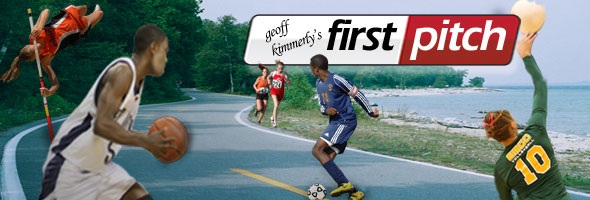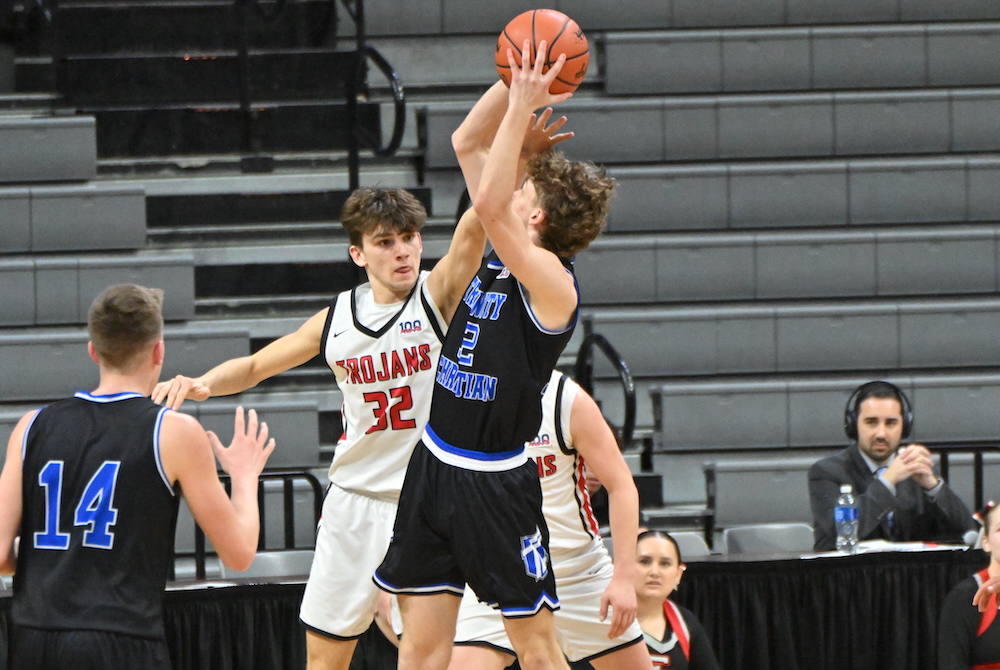
Keep on Coaching
February 1, 2013
By Geoff Kimmerly
Second Half editor
A few weeks ago, I finally got my first chance this season to watch a friend coach his basketball team. After guiding some others at the lower levels, this is his first time running the varsity – something he wasn't sure he wanted to do with a 1-year-old just learning to walk, but a challenge he ended up taking on to the benefit of all those involved.
Simply put, he’s good. I've seen a lot of teams and a lot of coaches over the past 15 years, and although I wouldn't know much of what to do if I were walking the sideline, I felt pretty qualified in telling him I was impressed – even if he didn't buy that I was offering an unbiased opinion. The best news is he’s gone from not sure about this a few months ago to talking about next season.
We know, at least anecdotally, that coaching continues to get more challenging. The time commitment has grown substantially to make running a program a year-round endeavor in a lot of sports at a lot of schools.
That commitment – especially for coaches with children of their own – was a main reason referred to in a New Haven Post-Chronicle story Saturday that noted 23 football coaching openings in Connecticut at one point this offseason. That state has 146 football teams – meaning roughly 15 percent will have new leaders this fall.
And that got me thinking about my friend, about how glad I am he’s given this a shot, and how I've seen so many others either not do so, or not stick around long despite having some pretty nice success.
A study published last winter in Interscholastic Athletic Administration magazine – a product of the National Interscholastic Athletic Administrators Association – noted some predictable results of a study that sought to determine the biggest challenges faced by first-year high school coaches.
The toughest according to the study was balancing the demands of coaching and teaching, experienced by nearly half the respondents – 98 percent of which coached high school teams and 81 percent of which are teachers.
The next six reasons all were noted by at least 30 percent of those in the study – personal fatigue, securing community support, securing and caring for facilities and equipment, parental contact, keeping non-starting players motivated, dealing with schedule interruptions and motivating athletes to achieve consistent, peak performance.
Nothing there is earth-shaking, and most if not all of these challenges are faced by high school coaches regardless of how long they've been in the field. But I got a little more perspective from some of the 32 items that ranked as least challenging to the first-year leaders – keeping in compliance with state and league regulations, dealing with substance abuse issues, teaching sport skills and creating a positive team atmosphere – things that seem most important, and yet appear to be easiest to do. I’m not sure what that tells us – but I think it tells us something.
Click to check out the entire three-page breakdown of the study, plus the researchers’ recommendations to remedy some of what first-year coaches face.
Giving back to Saginaw
I love reading about high-level athletes – like a star-studded group of alums from Saginaw – giving back to where they got their starts.
Pittsburgh Steelers star LaMarr Woodley made a big impact before the start of this school year by donating $60,000 to cover all participation fees for athletes in his former school district. The Saginaw News’ Hugh Bernreuter writes today about how Woodley (Saginaw High), the Philadelphia 76ers’ Jason Richardson (Saginaw Arthur Hill) and former Oakland Raiders standout Stu Schweigert (Saginaw Heritage) have combined to give more than $865,000 back to their home communities.
Bernreuter also mentions the non-monetary contributions of the Golden State Warriors’ Draymond Green (Saginaw High) and former Indianapolis Colts receiver Blair White (Saginaw Nouvel).
Click to read more about it.
Quote(s) of the Week
While rifling through more papers on my desk, I found an article from the Washington Post from Sept. 2011 titled “How high school sports save our schools.” I was drawn to it in part because I spent more than a decade in a newsroom, and it was a piece by a reporter covering education who instead of reporting on school boards and the like, delved into the importance of interscholastic athletics to education as a whole.
He spoke of how participation continues to grow even as resources dwindle, and of data supporting that extracurriculars like sports are more effective than academic classes in teaching leadership, teamwork, time management and “other skills crucial for success in the workplace.” Later, he mentioned a study noting that those who participate in extracurriculars earned more a decade later.
Click here to read the entre piece. These passages struck me most.
“Coaches might be the only faculty members still allowed by our culture and educational practice to get tough with students not making the proper effort. They have the advantage of teaching what are essentially elective non-credit courses. They can insist on standards of behavior that classroom teachers often cannot enforce because the stakes of dismissing or letting students drop their courses are too high. …
“Students do better in activities they choose. If we provide more of them, led by committed adults … that can make a difference. We know the bad news about education. Dropout rates are high. Achievement scores are stagnant. But sports participation is going up, despite pressure to cut it back. Let’s cheer about that and look for a way to draw in more students.”

Tri-Unity Christian Sends Retiring Coach to Championship Day 1 More Time
By
Keith Dunlap
Special for MHSAA.com
March 13, 2025
EAST LANSING — One thing is certain.
Saturday will see the last game in the career of legendary Wyoming Tri-unity Christian boys basketball coach Mark Keeler.
The question now is whether Keeler will go out with a seventh MHSAA Finals championship, or a seventh runner-up trophy as he finishes off his 38th and final season as head coach of the Defenders.
Tri-unity Christian helped send Keeler, who announced his retirement earlier this season, to a fifth-straight championship game with a 67-46 win over Crystal Falls Forest Park in the first of two Division 4 Semifinals on Thursday.
“I asked my wife Cheryl before we came today to please pray for me because I’ve been pretty emotional all week,” Keeler said. “It’s hard sometimes after 38 years of coaching to realize it’s going to be my last game. At the same time, it’s amazing it gets to be at the Breslin in the championship. I think it’s a win-win situation.”
 There wasn’t much doubt from the start against Forest Park that it would be a winning situation for Tri-unity Christian, which made four of its first five shots from 3-point range and jumped out to a 20-6 lead by the end of the first quarter.
There wasn’t much doubt from the start against Forest Park that it would be a winning situation for Tri-unity Christian, which made four of its first five shots from 3-point range and jumped out to a 20-6 lead by the end of the first quarter.
The margin kept growing in the second quarter with the Defenders leading by as many as 21 points before going into the locker room at halftime up 38-19.
Tri-unity Christian shot 75 percent (15 of 20) from the field in the first half and limited Forest Park to 5 of 18 shooting.
“If we buy in on the defensive end, that is what’s going to win us championships,” Tri-unity Christian senior Keaton Blanker said. “That’s what we are here to do. We just bought into it. Everybody plays their role, and we have amazing trust in each other. It’s just a grind.”
Sophomore Cody Osbun led the way offensively for the Defenders (26-2), finishing with 16 points. Blanker added 11 points and senior Joey Mellon added 10 for Tri-unity Christan, which shot 64.1percent from the field (25 of 39) for the game and made 8 of 13 shots from 3-point range.
Senior Kevin Giuliani scored 16 points and sophomore Vic Guiliani added 10 for Forest Park (25-3), which advanced to the Semifinals for the first time since 2004.
“The start of the game didn’t go the way we wanted it,” Forest Park head coach Jason Price said. “Quick shots from us and easy layups for them in the first quarter. That’s just how the game went.”
The Trojans actually ended up shooting decent from the field, connecting on 44.1 percent of their attempts overall (15 of 34) and making 5 of 11 from 3-point range. But 15 turnovers didn’t help.
Forest Park was able to take the next step after losing in the Quarterfinals last year, and the future looks even brighter with six sophomores and a freshman on the roster. Kevin Guiliani, Matt Showers and Gabe Quevedo were the only seniors.
“We’re young,” Price said. “We’ve got a lot of talent coming back, and we’ve got some younger talent down at the middle school level. These (seniors) have paved the way.”
PHOTOS (Top) Tri-unity Christian’s Brayden Nelson (12) grabs a rebound near Forest Park’s Vic Giuliani on Thursday. (Middle) Kevin Giuliani, right, and the Defenders’ Joey Mellon ascend for the game’s opening tip.

